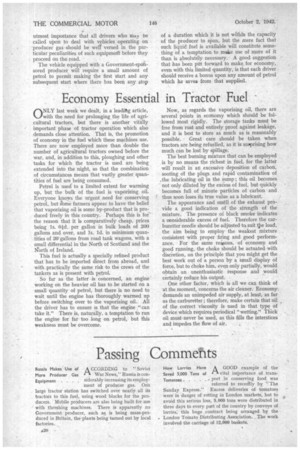• Economy Essential in Tractor Fuel
Page 22

If you've noticed an error in this article please click here to report it so we can fix it.
ONLY last week we dealt, in a leaditig article, with the need for prolonging the life of agricultural tractors, but there is another vitally important phase of tractor operation which also demands close attention. That is, the promotion of economy in the fuel which these machines use. There are now employed more than double the number of agricultural tractors owned before the war, and, in addition to this, ploughing and other tasks for which the tractor is used are being extended into the night, so that the combination of circumstances means that vastly greater quantities of fuel are being consumed. Petrol is used to a limited extent for warming up, but the bulk of the fuel is vaporizing oil. Everyone knows the urgent need for conserving petrol, but Ibme farmers appear to have the belief that vaporizing oil is some by-product that is produced freely in this country. Perhaps this is for the reason that it is comparatively cheap, prices being is. Old. per gallon in bulk loads of 200 gallons and over, and is, id. in minimum quantities of 20 gallons from road tank wagons, with a small differential in the North of Scotland and the ',forth of Ireland.
This fuel is actually a specially refined product that has to be imported direct from abroad, and with practically the Same risk to the crews of the tankers as is present with petrol.
So far as the latter is concerned, an engine working on the heavier oil has to be started on a small quantity of petrol, but there is no need to wait until the engine has thoroughly warmed up before switching over to the vaporizing oil. All the driver has to ensure is that the engine "can take it." There is, naturally, a temptation to run the engine for far too long on petrol, but this weakness must be overcome. Now, as regards the vaporizing oil, there are several points in eccmomy which should be followed most rigidly. The storage tanks must be free from rust and entirely proof against leakage, and it is best to store as much as is reasonably possible. Great care should be taken when tractors are being refuelled, as it is surprising how much can be lost by spillage.
The best burning mixture that can be employed is by no means the richest in fuel, for the latter will result in an , excessive deposition of carbon, sooting of the plugs and rapid contamination of the lubricating oil in the sump; this oil becomes not only diluted by the excess of fuel, but quickly becomes full of minute particles of carbon and ' thus soon loses its true value as a lubricant.
The appearance and smell of the exhaust provide a good indication of the strength of the mixture. The presence of black smoke indicates a considerable excess of fuel. Therefore the carburetter needle should be adjusted to, suit tile load, the aim being to employ the weakest mixture consistent with proper firing and good performance. For the same re4sons, of economy. and good running, the choke should be actuated with discretion, on the principle that you might get the best work out of a person by a small display of force, but to choke him, eve,n only partially, would obtain an unenthusiastic response and would certainly reduce his output.
One other factor, which is all we can think of at the moment, concerns the air cleaner. Economy demands an unimpeded air supply, at least, as far as the carburetter; therefore, make certain that oil of the correct viscosity is used in that type of device which requires periodical "wetting." Thick oil must•never be used, as this fills the interstices and impedes the flow of air.




























































